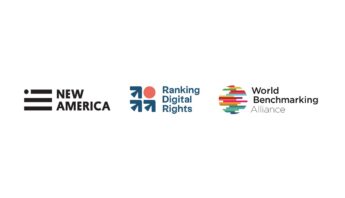The 2015 RDR Corporate Accountability Index was RDR’s first Index, released in November 2015. The 2015 RDR Index methodology development and research processes described below were preceded by an earlier phase of research and consultation, described on our methodology development page.
2015 RDR Index Methodology Development
The 2015 RDR Index methodology was developed in two phases: drafting, consultation, and revision; followed by a pilot study and further consultation.
1. Drafting, consultation and revision: After an initial phase of case study research and stakeholder consultation we undertook a process of iterative drafting, consultation and revision before arriving at a pilot methodology.
- Phase 1 Draft Methodology v1 (February 2014): This was the first iteration of RDR’s methodology.
- Phase 1 Draft Methodology v2 (May 2014): This was the second iteration of RDR’s methodology, incorporating insights from our case study research as well as feedback from a variety of stakeholders. We invited stakeholders and the public to comment on this version.
- Phase 1 Pilot Methodology (October 2014): This was the third iteration of RDR’s methodology, based on feedback we received on version two. This is the methodology tested in the pilot study.
2. Pilot study: In October 2014 in partnership with Sustainalytics we launched a Pilot Study, testing the methodology on 12 companies. The research was completed in January 2015. Following consultations with stakeholders on the draft, a revised version of the pilot study report was published. A blog post describing the study is here and the full report can be downloaded here.
- 2015 RDR Index Indicators. These were the indicators used for the 2015 RDR Corporate Accountability Index, the product of revisions based on what we learned from the pilot. Also see the list of companies.
- 2015 Methodology. This document provided further explanation about how we applied the indicators to examine 16 companies.
2015 RDR Index research process
After the consultation, revision, and pilot process described above, the Index methodology was finally ready to be used to produce RDR’s inaugural Index, the 2015 RDR Corporate Accountability Index.
The research and evaluation process for the 2015 RDR Index was carried out jointly by RDR, Sustainalytics, and a team of international researchers, using the following steps:
- Primary research – Researchers were assigned specific companies, and they collected information for each indicator for that company.
- Peer review – A second set of researchers checked the work of the primary researchers, raised questions, and suggested changes.
- Reconciliation – Researchers from RDR resolved differences between the primary research results and peer review.
- Company review – Initial results from step 3 were sent to companies for comment and feedback.
- Horizontal review – Researchers from RDR and Sustainalytics examined results on each indicator across companies to ensure consistency and quality control.
- Revision – RDR and Sustainalytics processed company feedback and made decisions about results.
- Final results – RDR finalized the data and generated scores based on the findings.
Note on national contexts affecting company performance: In most countries, certain laws, regulations, or political factors will either enhance or limit a company’s ability to perform well on certain indicators. Our methodology does not compensate for these factors. In other words, the RDR Index evaluates companies on what they do or don’t do, regardless of the reason. However, narrative profiles for each company include an analysis of how the company’s home jurisdiction’s legal, regulatory, and political environment may have affected its score.



